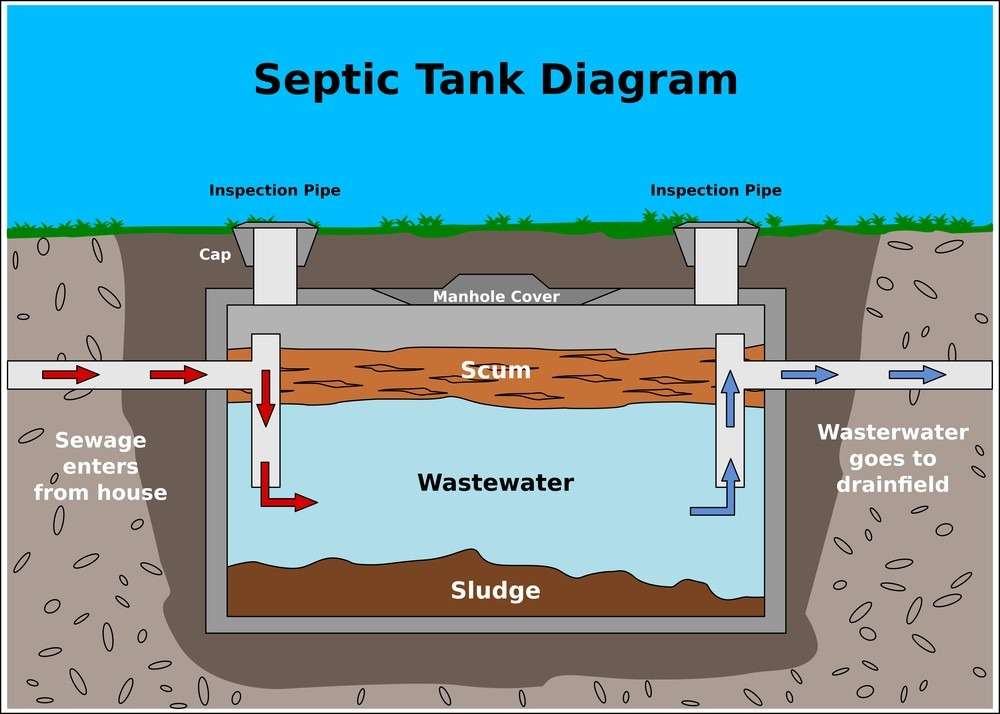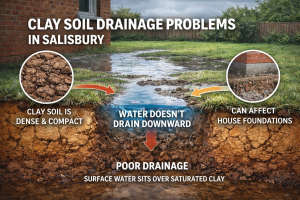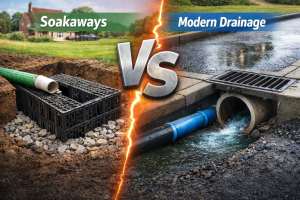For property owners and managers, understanding the intricacies of wastewater management is essential, particularly when it comes to maintaining efficient drainage systems. Septic tanks play a crucial role in supporting drainage for multiple occupancy residences and businesses, providing an effective solution for handling sewage and wastewater. At Drains24, we specialize in septic tank services, ensuring that your system is functioning optimally. In this post, we’ll discuss how septic tanks work, the types available, and their importance for managing drainage systems.
How Do Septic Tanks Work?
Septic tanks are underground chambers designed to treat and dispose of wastewater from residential or commercial properties. Here’s how they work:
- Wastewater Inflow: Water from bathrooms, kitchens, and laundries flows into the septic tank through pipes connected to the building’s plumbing system.
- Separation of Waste: Inside the tank, wastewater undergoes a natural separation process:
- Solid Waste: Heavier solids (sludge) settle at the bottom of the tank, forming a layer of sediment.
- Floating Waste: Lighter materials, such as grease and oil, rise to the surface, creating a scum layer.
- Effluent: The partially treated liquid waste (effluent) sits in the middle and flows out of the tank into the drainage system.
- Effluent Treatment: Once the effluent is discharged from the tank, it is usually directed into a drain field or leach field. Here, it percolates through the soil, which naturally filters and further treats it before it reaches the groundwater.
Importance of Septic Tanks for Multiple Occupancy Residences and Businesses
- Effective Waste Management: In multiple occupancy residences (like apartment buildings) or commercial entities (such as restaurants, hotels, and offices), a sufficient waste management system is critical. Septic tanks efficiently handle larger volumes of sewage and wastewater, ensuring all waste is managed effectively.
- Cost-Effective Solutions: Installing septic tanks can be a more economical choice compared to connecting to municipal sewage systems, especially in areas that are less densely populated. This is beneficial for developers of multiple occupancy residences who want to minimize operational costs.
- Environmental Sustainability: Septic tanks naturally treat wastewater without the need for chemicals, providing an environmentally friendly option. They help reduce the burden on municipal treatment plants and support local groundwater recharge.
Types of Septic Tanks
There are several types of septic tanks, each catering to different needs and scenarios:
- Concrete Septic Tanks: These are the most common type. They are durable, resistant to rust, and have a long lifespan. They can accommodate larger volumes of wastewater, making them ideal for multiple occupancy properties.
- Fiberglass Septic Tanks: Lighter and easier to install than concrete, fiberglass tanks are resistant to corrosion and root intrusion. They tend to be less prone to cracking but may not hold up as well under heavy loads, making them more suitable for smaller residences.
- Plastic Septic Tanks: These tanks are lightweight and resistant to corrosion but require careful installation due to their vulnerability to damage. They are often used in residential settings with moderate wastewater volumes.
- Advanced Treatment Systems: For businesses with higher wastewater volumes or specific treatment needs, advanced systems (like aerobic septic tanks) provide additional treatment processes, improving effluent quality before it enters the drainage field.
Maintenance of Septic Tanks
To ensure the longevity and effectiveness of your septic tank, regular maintenance is essential. This includes:
- Regular Inspections: Scheduled inspections can help identify issues before they escalate.
- Pumping Out: Tanks should be pumped out every 3 to 5 years to remove built-up sludge and scum.
- Wastewater Education: Educating tenants or staff about proper waste disposal can prevent clogs and other issues. Avoid flushing non-biodegradable items and grease down drains.
Conclusion
Septic tanks are an essential component of effective drainage systems, particularly for multiple occupancy residences and businesses. Understanding how they work, the types available, and their importance for waste management and environmental sustainability can help property owners make informed decisions.
For all your septic tank and drainage needs in the Salisbury area, Drains24 is here to assist. Our expert team provides comprehensive services, from installation and maintenance to emergency repairs. Contact us today to learn how we can help support your drainage system and ensure the efficient operation of your wastewater management solutions!







